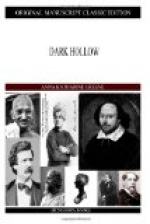“Did the officer you met on your return from Tempest Lodge follow you to Shelby?”
“I have not seen him.”
“That is bad. He followed Oliver.”
“It was to be expected.”
“Oliver is in Canada?”
“Undoubtedly.”
“Which means—”
“Delay, then extradition. It’s that fellow Flannagan who has brought this upon us. The wretch knows something which forbids us to hope.”
“Alas, yes.” And a silence followed, during which such entire stillness rested upon the house that a similar thought rose in both minds. Could it be that under this same roof, and only separated from them by a partition, there brooded another human being helplessly awaiting a message which would never come, and listening, but how vainly, for the step and voice for which he hungered, though they were the prelude to further shame and the signal for coming punishment.
So strong was this thought in both their minds, that the shadow deepened upon both faces, as though a presence had passed between them; and when Mr. Black rose, as he very soon did, it was with an evident dread of leaving her alone with this thought.
They were lingering yet in the hall, the goodnight faltering on their lips, when suddenly their eyes flashed together in mutual question, and Deborah bent her ear towards the street.
An automobile was slowing up—stopping—stopping before the gates! Deborah turned and looked at Mr. Black. Was it the police? No, for the automobile was starting up again—it was going. Whoever had come had come to stay. With eyes still on those of Mr. Black, whose face showed a sudden change, she threw her hand behind her and felt wildly about for the door-knob. She had just grasped it— when the bell rang. Never had it sounded so shrill and penetrating. Never had it rung quite such a summons through this desolate house. Recoiling, she made a motion of entreaty.
“Go,” she whispered. “Open! I cannot.”
Quickly he obeyed. She heard him pass out and down the walk, and through the first gate. Then there came a silence, followed by the opening of the second gate. Then, a sound like smothered greetings, followed by quickly advancing steps and a voice she knew:
“How is my father? Is he well? I cannot enter till I know.”
It was Oliver!—come from some distant station, or from some other line which he had believed unwatched. Tumultuous as her thoughts were, she dared not indulge in them for a moment, or give way to gratitude or any other emotion. There were words to be said—words which must be uttered on the instant and with as much imperiousness as his own.
Throwing the door wide, she called down the steps:




